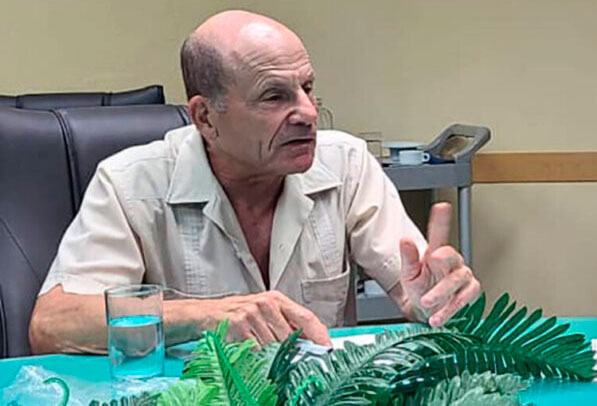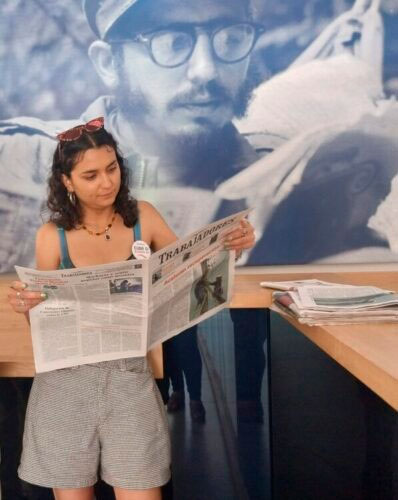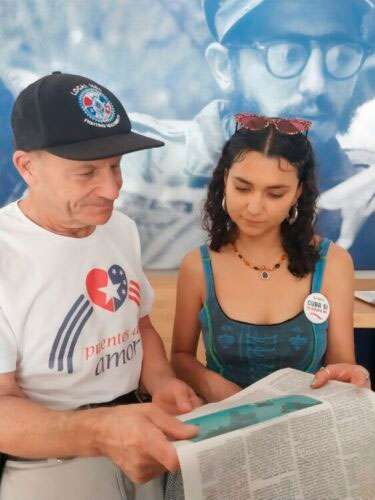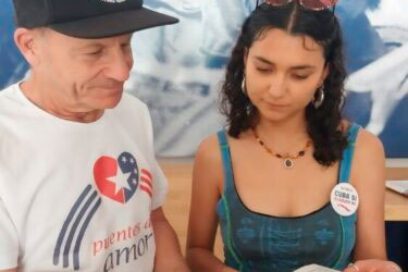After months of intense coordination, almost a thousand foreigners are already in Cuba, motivated by solidarity and interested in participating in the celebrations for May Day and in the International Meeting organized every year on this date. Some of them arrived weeks before to take part in improvement and training activities coordinated by the and the regional representation of the World Federation of Trade Unions in Havana.

This group of early participants includes an important representation from the United States: This year we have formed a delegation of 55 people from 10 cities and more than 14 organizations,» Mark Friedman, one of the coordinators of the Los Angeles Hands off Cuba Committee (LAHOC), whose impact has spread to other cities and sectors of northern society, explained to Trabajadores.
«We have, for example, 11 trade unionists from Amazon, from New York; as well as union delegates from restaurants, hotels and sewing centers in the U.S. A group of Filipino activists for the defense of the rights of Asian and Latino immigrants also traveled.
«These people, mostly young people, have participated in activities against the blockade in the U.S. and have contributed to collecting donations and medical aid. Between all of us we collected more than 50 suitcases, a large part of which we delivered to the Calixto García Surgical Clinical Hospital. The rest went to other institutions.
«However, the most important thing is the political contribution we make when we return, when we talk about Cuba in universities, trade unions and wherever we can gather support for our struggle against the blockade and to remove the country from Washington’s list of terrorist states.
Solidarity + Trade Union Activities

The Hands off Cuba committees in Los Angeles and the one in Cleveland, coordinated by Brenda López, who is also part of the delegation, are distinguished by the number of young people and union members: «We have machinists, longshoremen, roofers, steelworkers, mechanics and other trades. There are also support groups for immigrant communities. It’s a structure whose diversity can serve as a reference for solidarity groups in other places,» says Friedman.
«In the U.S. we are experiencing an unparalleled crisis of capitalism, with protests and demonstrations by workers who are beginning to organize. A few days ago, for example, there was a very important union victory in Tennessee, where the employees of a powerful automobile factory (Volkswagen) decided to join the United Auto Workers union.
«This environment creates a gap that we take advantage of to expose our truth. When strikes or mobilizations are organized in our cities, we go there, set up our table with a big flag and distribute literature, flyers and other propaganda to explain the impact of U.S. sanctions. We also talk about the things that make us feel proud of this country, such as the solidarity it offers to other countries or the way it consulted and approved the Family Code, a process unthinkable in my country.
«We also attended demonstrations calling for an end to the war in Gaza, where we stated Cuba’s position regarding Palestine. On other occasions we support actions promoted by and his Bridges of Love team in Seattle and Miami».
Discovering Cuba
Many things changed for Brenda López when she discovered Cuba. She was born in Inglewood, in Los Angeles, «a very low-income area,» she says, where most of its inhabitants come from other lands or are «first generation» youths as they call the U.S.-born children of immigrants: «Our parents are working all the time, they don’t know English, and they don’t have much time to spend with their children.
It was in this context that he met Mark Friedman, who at the time was a public school teacher: «He was my high school teacher and I became involved with the marine biology group he led. During those four years he was the only teacher who provided us with opportunities and experiences that are usually done as a family, like going camping, visiting interesting places, interacting with other people. He understood the needs of the kids in my community, and I will always be grateful to him for that. I have kept in touch with him ever since.
«In 2019 he invited me to Cuba, to a conference on the environment. From this country I had just heard news on Telemundo where they called Fidel a dictator, something I didn’t believe, of course, so I accepted.
«Coming here was like taking a blindfold off my eyes. In the U.S. we are denied opportunities to learn about non-capitalist options, so the good things about the socialist system, such as people having access to health care, owning a home, or that there are not as many homeless people as there are where there is a crisis with that issue, are unknown.
«In Cuba I find answers and examples of things that young people can do to lead a better life. Things will not get better for our generation, there are statistics that prove it. Most of us, for example, will never be able to have our own house, we are doomed to pay rent all our lives and more and more expensive, to the point that many spend more than half of their salary on it,» he reflects.
Upon returning from that visit in 2019, Brenda, Mark and other participants founded LAHOC: «When talking about Cuba, people do not know that the blockade remains, many were left with those statements made by former President Barack Obama in 2016 and the reestablishment of diplomatic relations between the two countries. By explaining to them that, in addition to the blockade, 243 sanctions were added and that President Joe Biden returned them to the list of States sponsoring terrorism, people feel that they have been deceived, that all the time they have been manipulated with information,» says López.
«The propaganda that is made through the news denies the truth of the impact of the blockade and holds socialism responsible for the problems you have,» he states.

Aims and Methods
«Our aim is to eliminate the blockade, remove Cuba from the list and return the space occupied by the Guantanamo Naval Base to them,» Brenda says.
Mark assures us that in Los Angeles several Cubans have participated in the activities of the Committee because, in spite of the critical positions they may have towards the government, the great majority of the emigrants are against the blockade.
Lopez recalled, for example, the actions in support of Global Health Partners (GHP), a company licensed by OFAC to import medical supplies to Cuba. They received the funds raised at the concert of pianist Dayramir González and now they are collaborating in a campaign to bring pacemakers.
Where I live there are many nurses and doctors,» she says. We have organized events for them where we show materials about Cuba’s health system. Just the day before we left for here, Earth Day was celebrated and on that occasion we talked about
, and the efforts made by the Cuban state to confront environmental deterioration.
In its activities, the Committee has screened audiovisuals made by the group of young Cuban filmmakers of the Belly of The Beast (En el estómago de la bestia) project, who address various topics for the U.S. public in a lighthearted manner. One of its members (Liz Oliva Fernández) recently toured 12 U.S. cities to exhibit her work. In Los Angeles, she performed before 500 people from universities, unions and high schools, convened by several organizations, including LAHOC.
One of the resources that has given us the best results is to spread the reality of Cuba through its own culture, so we organize exhibitions and cinema debates on emblematic films such as Strawberry and Chocolate, which we screened last June in Cleveland during the days that are usually dedicated to the queer and lgbtqia + movement,» said Lopez.
«Cuba has a lot to offer, a lot. When you start looking you find more and more. You also discover everything the U.S. does to make life here more difficult. Each visit, more than solidarity, is a learning experience,» emphasizes the young woman of Mexican origin.

Expanding Solidarity
«I studied to be a graphic designer, I work in that; but last year I moved to Ohio and there I am doing political education in an autonomous university that we founded together with a group of altruistic professionals,» Brenda Lopez said.
«The essence of this school is anti-capitalist, the courses are bilingual (Spanish and English), and we teach the classes through the Internet. In general we address subjects that allow us to understand the capitalist system. It is completely voluntary work. Graduates can get involved as teachers, be part of the project and contribute to its sustainability. Everything is free, we only receive donations to finance the online transmission system. We teachers don’t charge for sharing what we know,» he acknowledges.
Between November 16 and 17, 2023 López was in Brussels. She was one of the youngest witnesses who participated in the International Tribunal against the Blockade of Cuba that took place in the European Parliament. This joint effort of European, Latin American and U.S. jurists, social, trade union and political organizations managed to rigorously expose why the policy of the economic, commercial and financial blockade imposed by the United States on Cuba since 1962 is illegal and inhumane.
«Many of the testimonies addressed the impact of the blockade, but I focused on my experience as a young American. I explained that my generation is finding things increasingly difficult, those of us who were able to study will be in debt for the rest of our lives, and many, when they leave college, will not find work.
«Nor will we have much chance of owning our own home. There is a study that proves it; and we will suffer the effects of environmental pollution and climate change for a longer period of time. On top of all this, there are additional obstacles such as the blockade against Cuba, for example.
«I know farmers in Ohio who want to export part of their production, but the laws of my country do not allow them to do so. I also know of young scientists who cannot exchange with their Cuban counterparts, not even in matters in which there are notable advances here. I am thinking, for example, of Heberprot-P, the Cuban drug that cures diabetic foot ulcers and could prevent the amputation of the affected limb of thousands of people every year.
«How can we explain to that person who today is missing a finger or a foot, that in Cuba there is a medicine that could have saved him but that the government of his country does not allow him to use it? Unfortunately, many of the sick people who reach that stage of the disease live in the poorest areas of our country, many are of African descent and live in those areas called food deserts, where there is little access to adequate food and a lot of junk food.
«What does it mean when your government tries to hide these things? How can an island, with a stifled economy, educate its people and provide them with health care?» he asks. These are questions that leave people thinking because they show that it’s not that there is a lack of money, it’s that there is no desire to do it.
«It is one thing to read about Cuba, to see it on TV, but it is quite another to come here, to talk to Cubans, to know their culture, to understand what the Revolution means. It is super shocking and I understand how dangerous it can be for the defenders of capitalism to know examples of what can be done with a different system, that’s why it silences them, it is part of a war that is also intellectual.
«When we start talking about what’s going on in this country it reveals a lot of things, almost all of them bad, that the United States does, and hides, around the world. In the end it’s all very interconnected and, if you pay attention, Cuba will help the blindfold fall off your eyes.»


